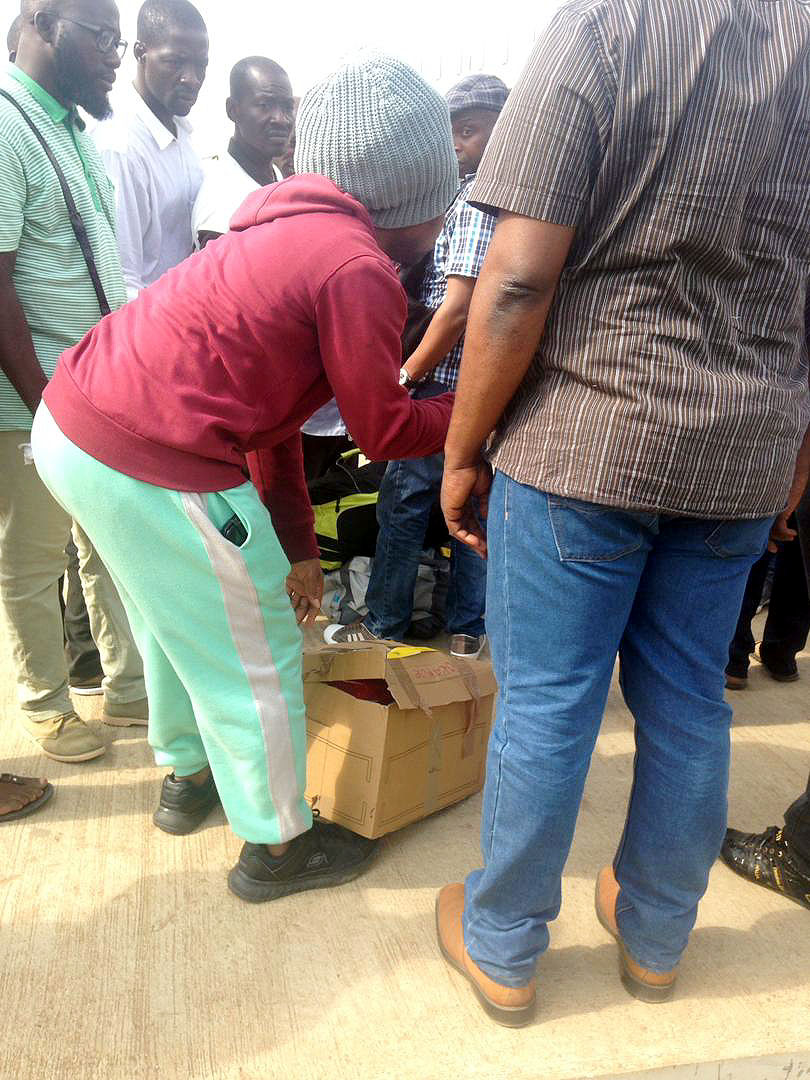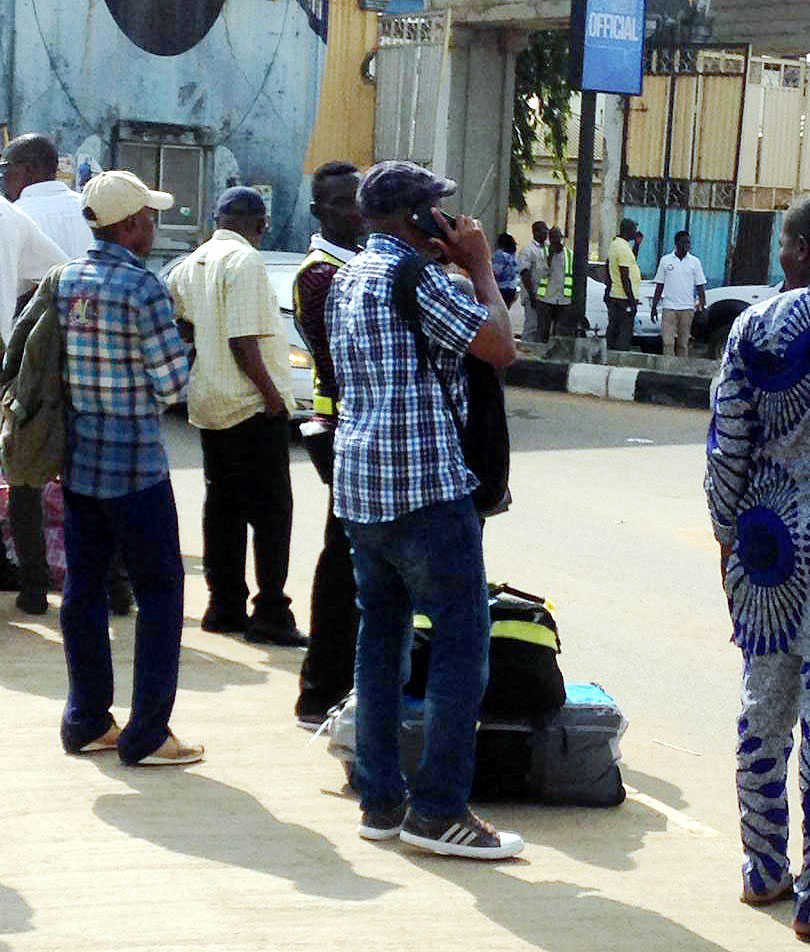Our Correspondent in Nigeria, Raphael Adenaike, was at the Lagos airport when Nigerian deportees, including a single mother of one, arrived from Germany on Monday 19 August. The deportees, whose asylum applications had been rejected, narrated their personal ordeals and experiences with the German police, immigration officials and medical doctors as well as the Nigerian Embassy to Raphael.
With little or no personal belongings, 20 Nigerian migrants deported from Germany on Monday, August 19, stood in pensive mood at the entrance of the Nigerian Aviation Handling Company (NAHCO), located near the Murtala Muhammed International Airport, Lagos, Nigeria.
“He has mental problem”
Among them was a mentally impaired young man. Looking confused and excessively anxious, the returnee picked his box of drugs and walked hastily away with no apparent destination in view.
“He has mental problem,” said one of the returnees.

Others still shocked to find themselves back in the country, at a time they didn’t bargain, for tried to reach their relatives on phone.
Having had their requests for asylum rejected by the German government, they had been flown back to the country and on arrival, were subsequently driven in a white bus into the premises of NAHCO with no one to attend to them.
Police burst into apartment at 4 am
A few of the returnees, who converged at the Welcome Centre Hotel on the Airport road, narrated their ordeals, living in Germany.
A light-skinned man, who refused to disclose his name, told The African Courier that the police burst into his apartment at 4 am. He said he sustained injury on the wrist while struggling with them. The 30-year-old Edo State indigene added that he was overpowered, arrested and taken to the hospital for treatment.
“From hospital to police station and then to court,” said the returnee.
He also accused the Nigerian Embassy in Germany of conniving with the German authorities to get him deported. According to him, the Embassy failed to issue him a passport, which he said would have helped secure his lost job.
“When I got to the Embassy, they said I should provide anything they could use to identify that I was a citizen of Nigeria. I said I did not have anything. And the Embassy said, that meant I was not a Nigerian citizen and it couldn’t issue me a passport or travel certificate,” he said.
He added that the Embassy later issued the travel certificate that Germany used to forcibly deport him even when his nationality could not be ascertained.
Hands and legs shackled
Aboard the flight, the returnee said they were cuffed in the hands and legs with three security personnel accompanying each passenger.
He further stated that he had appealed his repatriation order, but added that his lawyer compromised in the interest of the German authorities despite the fact that he had paid him €40 monthly.
Another returnee, who gave his name only as Mike, said he hailed from Edo State and travelled to Germany in 2013. He had departed Belgium to Germany to visit his brother and also undergo tumour surgery, which he said had lingered for long.
Mike noted that while he was bedridden, immigration officers were working with doctors to ensure a false report was given about his health status, which would be tendered in the court to fast-track his repatriation.

“They knew that if a correct report was given on my health condition, I might get my legal stay. So, they tried every means to make sure they kicked me out of the country,” he lamented.
The doctor, according to Mike, insisted that he was healed even when “my lawyer disagreed with him.”
“The doctor said the tumour was no longer there that I was only taking pain medication. My lawyer wrote to the court but the court rejected his appeal. The court said that since I had a brother in Germany, if I was sent back to Nigeria, I should contact my brother to be sending me the medications,” said Mike.
Forced to take different types of capsule
He lamented that the Nigerian Embassy in Germany failed to stop his deportation, despite knowing his health condition. According to Mike, the Embassy issued him a Travel Certificate, despite promising to protect him on health grounds.
The returnee recalled that “they (immigration officers) were supposed to deport me on July 2, but because I was very sick, they couldn’t do so. That very morning police came to force me to take different types of capsule even when I had not eaten anything. They knew I was very sick so they tried to make sure that I was fine for the Lufthansa flight they had booked for me.”
READ ALSO Anger at Lagos airport as Nigerian deportees arrive from Germany
Mike stated that the pilot eventually rejected him and asked the police to hospitalize him.
“One of the police officers got mad,” said Mike, quoting him to have said that “you want to remain in Germany, right? You want our government to be treating you. Can I stay in Nigeria and expect the Nigerian government to treat me if I’m sick?”
The 42-year-old, who was arrested on May 6, said that he was incarcerated for almost four months before deportation.
Single mother narrates ill-treatment
Similarly, a single mother of one, identified only as Esther also narrated the ill-treatment meted to her by the immigration officers. Being an asthma patient, Esther said that her health condition worsened upon hearing that her asylum was over.
“So, my lawyer and I applied for another asylum because of my health issues, but I was declined,” said Esther.
“I began to have serious health issues. I called the ambulance; they took me down to the general hospital. I spent five days. When I was about to leave, the doctors suggested that I see a lung specialist since I was having acute asthma.
“The specialist told me I was having problem with my organs, saying that my lungs were not pumping.”
Esther added that she was sacked at her work place and told to provide her passport before she could secure back her job. She also said that she needed to undergo a lung surgery, which required that she made her passport available.
“I knew that if I should drop my passport, they would deport me. So, I did not give them,” said the returnee.
READ ALSO New law for quicker deportation enters into force in Germany
Esther said further that she consulted her lawyer, who advised that she provided her passport to get medical treatment.
“Immediately I got to the hospital, they gave me a tablet and the doctor closed my mouth. The next thing, I felt a needle in my arm. As I was about to move, they just cuffed my hands and legs right on the hospital bed. They brought an ambulance to transport me to the airport. On our way, the police woman slapped me. I was chained till we got to Nigeria and the handcuffs were removed when we were about to land and my son was given to me,” Esther narrated.
“Right from that day, my son and I started vomiting and stooling because of the drugs we were given. I did not believe that they could do such a thing to a person with a child”.
Nigerian Embassy issues travel certificates without verification
Another migrant Isaac Baresi, 39, alleged that the Nigerian Embassy, which was meant to protect its citizens, spearheaded the issuance of travel certificates, even to people whose nationality could not be verified.
“Many people who are not Nigerians are also deported to Nigeria because the Nigerian Embassy issued travel certificate,” said Baresi.
“I know one Ghanaian guy,” he added.
“I do not have a father or mother, that’s why I left Nigeria to go and hustle.”
The returnee said that he was deported in prison uniform and handcuffs.
READ ALSO 11,500 persons deported from Germany in first half of 2019, says federal government
“I spent three months inside the prison,” said Baresi, adding that “life has been very difficult since I came back to the country.”
Nigeria’s ambassador to Germany, HE Yusuf Maitama Tuggar, has always maintained that the Embassy does not issue travel certificate when any Nigerian is being unduly deported.
He called on Nigerians to dismiss rumours making the rounds that the Embassy was colluding with the German authorities. “We will not support any efforts to remove any Nigerians unjustifiably,” he assured.
Rapael Adenaike is the new Correspondent of The African Courier in Nigeria
*******Watch out for the continuation of the Exclusive Report
 THE AFRICAN COURIER. Reporting Africa and its Diaspora! The African Courier is an international magazine published in Germany to report on Africa and the Diaspora African experience. The first issue of the bimonthly magazine appeared on the newsstands on 15 February 1998. The African Courier is a communication forum for European-African political, economic and cultural exchanges, and a voice for Africa in Europe.
THE AFRICAN COURIER. Reporting Africa and its Diaspora! The African Courier is an international magazine published in Germany to report on Africa and the Diaspora African experience. The first issue of the bimonthly magazine appeared on the newsstands on 15 February 1998. The African Courier is a communication forum for European-African political, economic and cultural exchanges, and a voice for Africa in Europe.


































